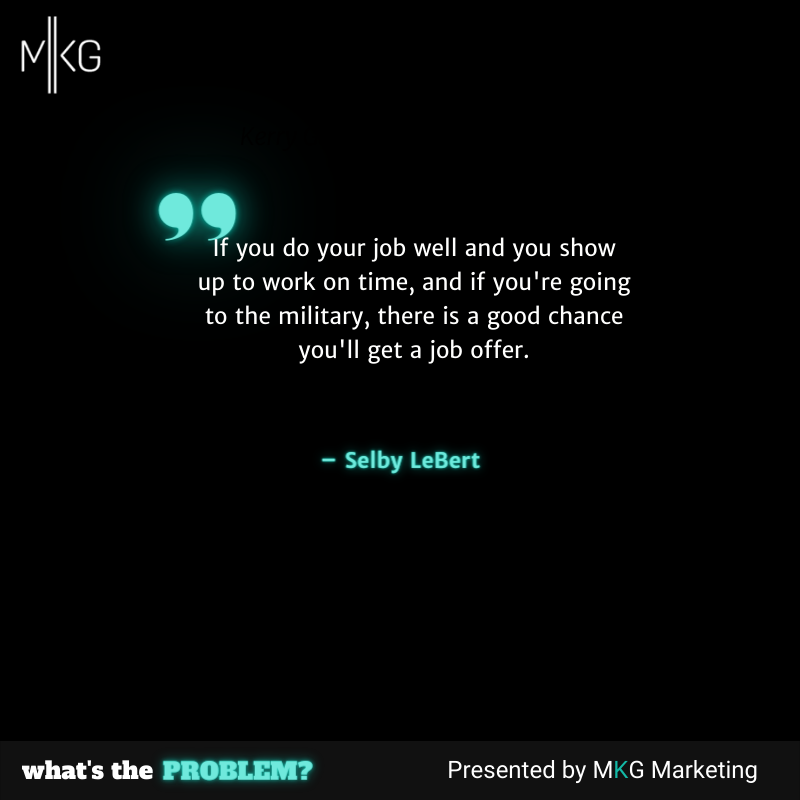Transcript
Opening
Hello everybody, and welcome to What's the Problem, the show that explores problems, scenarios, situations, solutions, and anything that's a hot-button topic in the world of cyber security.
Today, we are fortunate to have Selby Lebert joining us.
Conversation
Mike Krass: Selby, say hello to our listeners.
Selby LeBert: Hello, everyone.
Mike Krass: Selby, tell our listeners, why are you qualified to talk about security?
Selby LeBert: I've been working in cybersecurity for over 11 years now. I started at 20 years old, flunked out of college, joined the Air Force, and spent the last two years working with SpaceForce. I've got a bachelor's and a master's degree in cybersecurity and CISSP certification, and now, I am working for Textron Aviation as a security architect.
Mike Krass: Before we go any further, thank you for your service. We always want to honor and acknowledge that. Let's get to the second question here. We normally asked in the second question, what's the problem you want to explore with our listeners? But today, we're going to turn that around, and we're going to introduce the problem. You are going to introduce a solution that's very personal to the solution that you've lived. Let's introduce that problem. There are hundreds of 1000s of open security jobs; what will we do about this? You've got certifications, and you mentioned that folks could study for, take and earn those credentials. You can go the Indiana University route. Wichita State University in Kansas has a digital forensics program. You can be in the military, get some experience, and become qualified for some open security jobs. Your solution is better. Your experience is better than anything that I've just said. Selby, could you just tell us how you transitioned from the military into working at Textron? Let's dive into that a little bit.
Selby LeBert: I was very privileged that my leadership was willing to let me do this program because that's the main authority there. My unit let me go and do the DoD Skill Bridge Program. It enables you to separate from essentially active duty six months early and intern in the civilian world for free. Textron did not have to pay me for those six months. I was still receiving my military paycheck. I had to learn how to wear professional clothing because I've been wearing a uniform for ten to eleven years, and just reintegrate into society, and then also get that skill gap, because at least with cybersecurity, the principles are all the same, but how they're applied differs from place to place. And so that program allowed me to ease into the civilian world. I was offered a job. Not everyone gets offered a job, but most people do because you get situated. You're already there. There is a high number, but there is no promise in the DoD program that the company has to hire you at the end of the internship, and that's how I ended up at Textron. We have many other programs like that.
Mike Krass: Is your story a one-off with this Skill Bridge Program? Is this a one-on-one build for somebody? Tell me a little more about if others are going through this same process or even if you have similar interests as you used to at Textron.
Selby LeBert: Textron is expanding its reach outreach for the Skill Bridge program. It was quiet beforehand. I think there were maybe a half dozen people here in Wichita that had gone through the Skill Bridge Program and were hired on afterward. But now we have veterans that work in HR that specifically go out and find other veterans who are separating or close to retirement and try to bring them in. We have a huge talent pool in Wichita with McConnell Air Force base. Electron being an aircraft manufacturer, McConnell has one of the largest tanker wings. You have people that are getting out in a place that is affordable to live in, and that is already A&P certified. We're just trying to open that door and get more of them in, and that extends beyond the guys who are riveting sheet metal on two planes—our finance or HR, just like in the military, there's a job for almost anybody. Any of these big companies have the same needs. It's not just the people that work in the factories.
Mike Krass: For those who aren't aviation nerds like myself, A&P is airframe and powerplant. Talking about mechanics, they're back to security. Selby, how frequently do folks rotate into Textron? Is that a six-month program? 12 months? Tell us a little bit about the timing.
Selby LeBert: It is based on individual needs, so everyone's separation date from the military is different. Just six months from that, one of the things I liked was that they also put me with a veteran. He was my mentor, supervisor, and sponsor for this transition. I started around Thanksgiving and submitted all my paperwork about six months before that. So around May of 2021, I was finally making plans for what I would do.
Mike Krass: Okay, got it. It gives us a good idea of the timeframe there. I was going to assume that I should ask the questions that for folks that aren't hired on for whatever reason, in the end, what does that look like for them? I'm just trying to put myself in their shoes of what other opportunities exist because of the experience they earned through that program.
Selby LeBert: Other offices do help veterans get hired. I have not seen a lot of skill-bridge interns not get hired, not just at Textron but at other companies. Because that was the same question, I asked, what's the likelihood of me getting a job after this program? The guy in charge of the Skill Bridge Program at my last base said that in the program he was responsible for, 100% of the people got a job offer, but they didn't take the offer because they found a better one somewhere else. If you do your job well and you show up to work on time, and if you're going to the military, there is a good chance you'll get a job offer. And if not, you now have six months of experience to go and apply to another job. Not only that, six months allows you to ease into civilian life. Instead of those last 30 days, when you finally get all your household goods moved as a normal separation, you still have that entire six months where you're living as a civilian getting paid by the military. You're still allowed to look for other jobs. And as long as you have enough leaves saved up, you can just say, "hey, I'm done with this internship. I'm going to go take a job somewhere else." And so, as I said, "you're not stuck in that one job for six months. If you have the time and everything is saved for you.
Mike Krass: If you're coming out of the military, you should show up, dressed, squared away, and on time. What other advantages? I think that's an obvious one, at least to me, because I know folks in the military. What are some of the non-obvious advantages of bringing somebody beginning to separate from military service? What do some employers like Textron not know they're going to get, and then when they get that behavior or outcome, they're just, “oh, my gosh, this is amazing. I wish I had known about this beforehand.”
Selby LeBert: I work with another guy who has been with Textron for about five years and was also on active duty. He's now on guard with me as well. One of the things I noticed that was a little bit different with us is, at least in the military, we're always used just to make it work. We're innovative or quick on our feet when thinking about solutions instead of hitting A roadblock and telling the boss, " Oh, hey, couldn't do it.” It's just constantly being able to think on your feet because the military has had some years of rougher funding or lack of equipment. But at the end of the day, the plane still flies, and we get our mission. So that mentality comes to the civilian sector, and it's very helpful.
Mike Krass: It's like the invention of speed paper. Many folks are pilots for it whenever you see that on an airplane. Why is there duct tape on our airplane? You could probably hang at full size of gold and half of the empire state building with that duct tape, and they'd be just fine. It can take them up anything with it.
Selby LeBert: We've talked about it outside the military. Textron does have other channels to try and fill that skills gap. We've seen with the military how we helped the civilian sector. We've seen the same thing going back to aviation, where most commercial pilots fly, and your large commercial airliners come from the military. We're seeing that many IT guys on these gigs that require clearances will likely have a military or government employee background. If you don't have any of that, there are alternatives.
Mike Krass: You mentioned clearances. I just want to ask a question there. How do certain clearances expire for folks unfamiliar with different clearance levels in the military or government sector? Do you have to renew them? Talk to us uninitiated private sector folks a little bit about that. How long are your classes good for?
Selby LeBert: A clearance is usually good for about six to ten years, depending on your clearance level. If I know that the system is changing to continuous monitoring, they will randomly check your finances. They may investigate and say, "Hey, why didn't you report that you're three months behind on your mortgage?" That's an indicator, and that's something that they're going to investigate and dig into, or, "Hey, you won the lottery, and you didn't tell us now, all of a sudden, you just showed up to work in a brand new $150,000 Tesla, and we know you make $50,000 a year. That doesn't add up." I'm not sure; that's not my forte on how that all works. I haven't gotten in trouble. I still have my clearance, and my fellow employer, or employees that are cleared, haven't gotten into trouble either.
Mike Krass: It's a binary thing, either. You're in trouble. Not being in trouble is the right side of the fence. Before we get to our final question of this episode, is there anything else you think folks should be aware of when looking at programs like this? Whether hiring somebody exiting the military or if they were in your shoes that you saw occupy, is there one last piece of advice you'd like to share with the listeners there?
Selby LeBert: Just have a plan. I had to read, so I ended up re-enlisting at my seven-year mark. At my six-year mark, they allowed me to extend it for years. I did that. I had no luck finding jobs then, so I re-enlisted and decided I wanted to be in a position where I didn't need the military. Military's been good to me, but at a certain point, I wanted to grow roots and have stability for my family. The same reason many people end up getting out of the military. And so just have a plan; if you want to start nursing school or something, for example, cybersecurity, take as many classes as you can. At least in the Air Force, the military gives out $4,500 a year in tuition assistance, which is tax-free. You don't have to claim it or anything; just use it. You don't get a bonus check at the end of your service for not using it. I've seen it twice, at least in my career; when budgetary cuts start, your tuition assistance is the first thing that will either go away or be cut down. I believe it was last year. The $4,500 was temporarily cut down to $3,500. People got upset, so I said use it because it could be gone at some point when trying to get your life out. Start as soon as possible, go to school get certified. The Air Force has the AF cool program. It's a credentialing program. On top of getting my master's, I could go to a boot camp and get my CISSP certification all covered for free.
Mike Krass: Wow, that's incredible. You heard him out.
Selby LeBert: I was going to say throughout my career, I got about $30,000 in tuition assistance, which is when it came out.
Mike Krass: Well, to our listeners who are still on active duty or considering entering the military, you heard it here first. $30,000 tax-free, you don't have to claim it, not income there for you potentially to learn a new skill, get into the world of cybersecurity, sponsored CISSP, your security plus, anything that will cost you more than time. I hear loud and clear from you, Selby, that the military does commit its members to help you out and make that a reality.
Selby LeBert: Absolutely.
Mike Krass: Now, let's discuss every episode's last question. Selby, tell our listeners about a terrible haircut you had at some point in your life. Put a smile on their face.
Selby LeBert: Oh, God, that would have to be the first day of basic training when they just shaved your head completely. That was the day I realized my ears were bigger than I thought, and that one is probably one of the worse. They nicked me in a couple of spots, and just sweaty and covered in here and had to immediately go outside in the Texas heat in the middle of July. All unpleasant.
Mike Krass: I saw and heard that hair had been terrible. Thank you for bringing that to life for now. Many of our listeners will have some follow-up questions I'm not qualified to answer. If they want to get in touch with you to talk about the Skills Bridge Program, some of these military education stipends in the military, or discuss cybersecurity in general, what's the best way for our listeners to get in touch with you?
Selby LeBert: That would probably be my LinkedIn page. I'm the only Selby LeBert out there. I'm pretty easy to find. Just reach out on there if you want to talk about it more.
Mike Krass: Awesome. Well, Selby, thank you again for your service and part-time service in that regard. We appreciate you sharing some of this insight and knowledge with our listeners. And to our listeners, thank you as always for tuning into What's the Problem, the podcast that explores problems, scenario, situations, and anything involved talking in the world of cybersecurity. Until next time.

Selby LeBert
Air Force trained Cyber Security Subject Matter Expert with 10 years experience in Information Assurance, TEMPEST certifications, and Cryptographic support. Committed to maintaining cutting-edge technical skills and up-to-date industry knowledge. Recently obtained M.S. in Cybersecurity and working towards a CISSP certification.



